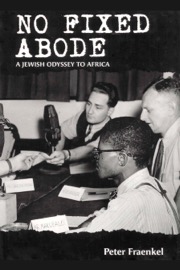 $9.99 on Kindle
$9.99 on KindleNo Fixed Abode: A Jewish Odyssey to Africa by Peter Fraenkel (98,000 words, 10 illustrations)
In this memoir, Fraenkel writes as a member of an enclosed minority: German Jew within a predominantly Lithuanian Jewish community which was part of a white settler community, itself a minority in a predominantly black African territory. A young settler reprimanded him for stepping out of the way of an African family on a narrow bush path: “Walk straight on. They must know who is the master in the land.” Fraenkel found himself whistling the Nazis’ anthem “Clear the streets for the brown battalions. The storm troopers are marching.” He was coming to learn the importance of not conforming.
“A vivid account of a childhood in a middleclass, non-observant Jewish family in Nazi Germany, forced to emigrate to Zambia (then Northern Rhodesia) in 1939.” — Trevor Gundry, Jewish Chronicle
“Peter Fraenkel... and his family emigrated in 1939 from Breslau to Northern Rhodesia, where he forged a successful career... in the Central African Broadcasting Service. Fraenkel was thus given the opportunity of using his undoubted skills as a broadcaster to help in the education of black people, using new methods of mass education... his sojourn in Northern Rhodesia came to an end in 1957, a few years after the country was refashioned by the British government as the Federation of Rhodesia and Nyasaland — a big mistake, Fraenkel thinks, and one that wasn’t undone until much later when the independent state of Zambia was created. His love affair with Africa came to an end, and he felt impelled to leave, because of his ‘dislike of racist politics in this bastion of white privilege’... Peter Fraenkel’s account of the 20 years in Northern Rhodesia is absorbing... there are riveting chapters on his activities as a somewhat subversive broadcaster, working together with like-minded whites and Blacks... The book is written in a very lively manner and there are countless anecdotes, many of them in direct speech... I recommend it strongly.” — Leslie Baruch Brent, Association of Jewish Refugees
“The book bursts with life. Countries like these Central African territories are... far more exciting than countries with a settled structure. Here a new society is emerging. This excitement is lost in official reports and academic studies and one of Fraenkel’s achievements is that he conveys it in full measure. I know of no book which more vividly describes the variety and throb of a modern African township.” — Max Gluckman, The Observer
“He brings out the formation of the new African metropolitan and rural societies... I know of no book which describes this surging varied vitality so well.” — Africa



